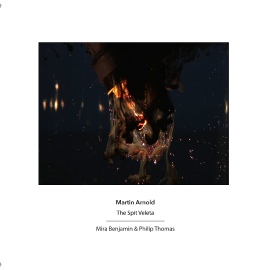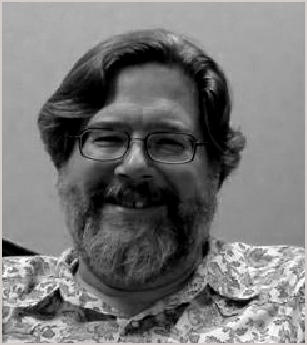Another Timbre TimHarrisonbre

at106 Martin Arnold ‘The Spit Veleta’ Canadian Composers Series #2
1 – Points & Walzes (2012) 21:15 Philip Thomas (piano)
2 – Slip Minuet (2014) 23:46 Mira Benjamin (violin) youtube extract
3 – The Spit Veleta (2015) 30:11 Mira Benjamin (violin) and Philip Thomas (piano)
CD copies of this album have now sold out. You can buy it as a download on our Bandcamp page here
You can still buy the complete Canadian Composers Series at the special offer price here and you will receive a free download of the Spit Veleta + a copy of Martin’s later CD ‘Stain Ballads’
Martin Arnold
The second CD in the Canadian Composers Series contains three recent works by the Toronto-based composer Martin Arnold, played by Mira Benjamin (violin) and Philip Thomas (piano). In his introductory essay to the booklet accompanying the Canadian Composers CDs, Nick Storring quotes a comment that Arnold made about one of his earlier works, highlighting a quality which Storring feels applies to a large part of Arnold’s compositional output: "The piece is not intended to be demonstrative but rather placidly elusive; it is not meant to sound recognizably innovative but rather disorientingly (but quietly and good-naturedly) perverse."
In the following extract from the interview with Martin Arnold in the Canadian Composers Series booklet, Arnold talks about the central part that listening to music has played in his development as a composer, and the wide variety of musical genres that have contributed to his elusive, strange and ‘slack’ style of music:
“I’m still first and foremost a listener. Listening is where the real action is, where consciousness and identity can change, be altered (if only a bit), where imaginings of difference and change can flow from. I guess I do listen to a wide range of music, but how I’m drawn to and engage with any given musical experience is always very specific and particular to me. I don’t like all of any kind of music. And I’m not really a collector in the sense of the collection having a character as a whole, or in the sense of being any kind of completist.
In terms of the music I produce, I make music that I want to listen to, that nourishes me, that I can’t find elsewhere, and that I have the skill to pull off in a satisfactory way. I suppose something that goes with this primacy of listening in my practice is that I’m not especially driven to make music. Since getting out of university, I’ve never asked an existing group to play a piece of mine. In terms of opportunities that I’ve had a direct hand in generating, I’ve co-founded a number of ensembles with close friends who could play my music, initially people I had gone to school with. Beyond that, it has almost always been friends or friends of friends who have approached me with possibilities for collaboration. Very occasionally a stranger has got in touch with me about making music but they have almost invariably become a friend. I think many of my friends wish that I’d try a little harder career-wise, but I’m happy to say that, despite my lack of ambition, this network of friends currently includes astounding musicians from all over the world, people who not only get what I’m on about but who contribute massively to who I am as a musician (and a person).
So I make music for and with friends. I don’t usually perform music, but there are a few notable exceptions: once a month, since 2000, I’ve played electric guitar with the Ryan Driver Quartet, performing standards from the great American songbook – always ballads – in a way that I call psychedelic lounge music rather than jazz. I said I play guitar, but really I play a 1968 Vox Invader; I don’t know if I could play a guitar that didn’t have all those effects on-board. And the strings are at least 23 years old; I’m not sure what happens if I ever break one but it wouldn’t be good (the late great Brian Schultz of Avenue Guitars in Edmonton, Alberta found me the guitar in a pawnshop in Edmonton in 1993 with the strings that are still on it). I also play tenor banjo with a psychedelic folk group called Mermaids and have played a number of different things in a number of different projects with Eric Chenaux. He’s based in Paris now but we are talking about doing more together sooner than later. I do go through periods where I improvise freely – most often on electric melodica or tenor banjo – with some amazing musicians from Canada and abroad, and I seem to be in one of those periods now. And thanks to Montréal’s Quatuor Bozzini, I have also had wonderful and really unexpected opportunities as a performer, like playing Christian Wolff’s music with the Wandelweiser Ensemble, or Cardew’s Paragraph 6 from The Great Learning in a group led by John Tilbury. The Bozzinis have played more of my music in more parts of the world than anyone, and have often been the friends whose friends get in touch with me to collaborate.
All the music I make is in some way melodic. I also think of all of it as being slack, meandering, psychedelic and, even at its most ponderously enervated, dance music. Moby once said of The Flamingos’ version of I Only Have Eyes For You that, along with being a beautiful performance of a beautiful song, it sounded like it was recorded underwater in a Methadone clinic. Even at its clearest, my music somehow aspires to this ideal.”
You can read the whole of Martin Arnold’s interview in the Canadian Composers Series booklet. The booklet comes free with any order of two or more of the Canadian series CDs, or you can order it separately below for £4.
